 As parents, we sometimes have questions that cannot be answered by looking at a report card or reviewing state standardized test scores. Some very common questions that parents have are…
Now there is a way to answer these types of questions. A Cognitive Analysis is an in-depth study of how a child thinks, learns, and communicates, and how those factors impact academic success. This is a valuable tool for any parent who wants to know and understand their child better. Every child has their own unique way of seeing and experiencing the world. Their mind processes information differently than any other individual. In a society where the mass production model of education is still the norm, parents must look for tools to help them discover how their child thinks and learns, what makes their child unique, and how best to encourage strengths while bolstering weaknesses. Cognitive Analysis is the gold standard for doing just this! Your child will experience a calm, friendly, relaxed atmosphere over the course of two to three sessions with me. Students regularly find the process both challenging and enjoyable! Parents find the information gleaned enlightening and invaluable. An in-depth cognitive report is provided, including individualized recommendations and information on a child’s strengths and weaknesses. A Cognitive Analysis is one of many tools I use to help families find educational solutions for their children. You can have the answers you need before school starts back again. Contact me for more information today! Summer slots are still available for a Cognitive Analysis or Educational Therapy.
0 Comments
 To all the Daddies, up at night with the little one while Mama gets some sleep.... To all the Mamas, taking their kids to school, sports, classes, and therapies.... For every Mom and Dad helping their kid with a late homework project the night before it's due.... To all of the Parents, bravely navigating the special education system to be the best advocate they can for their child.... Don't forget that you know your child better than anyone else. Your goals and dreams for your child go beyond the classroom door and are stored deeply in your heart. You are the key to your child's success! YOU ARE A TRUE SUPER HERO! Thanks for what you do.  About a decade ago I found myself working with a 10 year old boy who was behind his peers academically by a couple of grade levels. His parents were unsure why, and aside from ADHD, he had not been diagnosed with a specific learning disability. The first session I had with him gave me a few answers. I pulled out a page of single digit addition problems. "I can't do it", he said, and refused to put his pencil to paper. He had visual signs of anxiety. I wrote the problems on a small white board, and he still refused to try. Reading was a similar experience. What I found is that he easily demonstrated many of the skills that brought him so much anxiety when playing games, or talking about sports. Students who cannot push much past their current level of capability into a challenge before shutting down can be said to have a narrow "challenge threshold". These kids often struggle in school because any time a new challenge presents itself, they don't have the emotional resiliency to deal with the possibility of not succeeding. In this case, I stretched my client's challenge threshold little bits at time by having him try one problem, or by reading one page, or writing one sentence, then praising him for his efforts. I worked with him on developing a "growth mindset", basically helping him to value growth and learning over academic perfection. Over the next year, this young man gained two years of academic growth and a whole new level of confidence. We all have a challenge threshold. The wider our challenge threshold, the more prepared we are to tackle what life throws at us. Nurturing a wide challenge threshold in our children is another way that we can help our children experience life-long success! 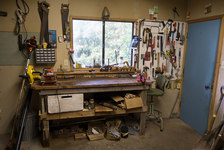 Short Term Memory is the "work bench" of the mind. It is the space in our thinking where we are actively working. It is the "surface" that holds the items we are actively thinking about, and where we "work" on those items, creating new thoughts and ideas. Different people have different "work bench" sizes, capacities, and levels of stability. Some people have large work benches that can hold vast amounts of information at one time. These people may be able to easily repeat back what they heard, often don't have difficulty taking notes on what they hear, and may be able to quickly recall details of what they read. Some people have work benches with smaller surface area. They may not be able to put as many items on their work benches before things start falling off. These individuals may lose track of conversations, may have difficulty recalling what they read, and may need to refer back to lists of tasks often in order to remember the next step. Short term memory can also be impacted by how much work is done with the items on the bench. This is called "working memory". Some people have a working memory that is strong enough that thoughts can easily be worked on, manipulated, re-organized, and built upon. People with a strong working memory can easily "work with" the information. For instance, they may be able to mentally re-organize a list of tasks, may be able to adjust ideas based on new information that they take in, or be able to create new ideas from what they already know. People with weak working memory may be able to keep information on their "work bench". Their short term memory may be fine, but their working memory is week and the entire "work bench" collapses under the stress. People with weak working memory have trouble thinking about what they hear, they have difficulty generating new ideas, and may forget things easily when they do more than just repeat back with they see or hear. Short term and working memory can be improved on with consistent practice with simple techniques. I often address challenges in working memory in my Educational Therapy sessions. There are also brain-training programs that address weaknesses in Short Term and Working Memory. Curious about your child's mental "work bench"?
With my Cognitive Analysis Program and Psycho-Educational Evaluations I am able to give parents powerful information about how their child learns, including their "work bench" capacity.  A couple of years ago I sat across the table from a middle school girl who was several grade levels behind when it came to reading comprehension. After a couple of sessions I realized that every word that she read was lost to her shortly after she heard herself speak it and that she was not creating visual images in her head of what she was reading. Creating mental images of what is read makes for a deeper reading experience. Just like you can think back to your 16th birthday and wonder why your uncle gave you bunny slippers instead of your favorite game, you can also think back and consider the events of a story you read. This is a skill that can be taught and after a couple of years of one-on-one intervention, my client is now nearing grade level comprehension and is savoring what she reads like she never has before. Below are a couple of programs to look over if reading comprehension and visualization is a challenge.  The Visualizing and Verbalizing program from Lindamood-Bell is the gold standard program for teaching visual imagery to support both spoken and written language. It is well researched, but requires training and expertise in order to administer the program to its maximum effect. 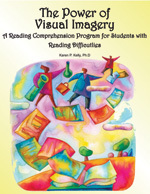 If there is a minor reading comprehension challenge, mostly with higher level thinking and grasping the deeper meanings of what is read, The Power of Visual Imagery might be what you are looking for It is a much less expensive book that can be ordered from Corwin Press or of of Amazon. It teaches some of the same Visualization Methods as Visualizing and Verbalizing, but without the intensity or repetition. 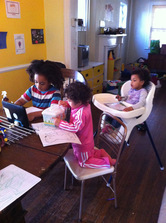 Homeschooling has become increasingly popular over the past decade as families find that traditional classrooms are not the best option for their family or child. At the same time, this decision should not be taken lightly. Below are five things to consider before deciding to home-school your child. Do you feel comfortable home-schooling? While we all have to do some things that we are not comfortable with, the goal with home-schooling is to give our child something better than they would receive at a traditional school. Because of this, the person doing the home-schooling needs to feel comfortable and capable in their role. One way to ensure this is to make sure that the curriculum you choose is the right one for you. More about curriculum choice in another post! Do you have a consistent schedule?-While home-schooling does have its flexibility, a predictable, consistent schedule is needed in order to ensure that learning is accomplished. If your life is already hectic and crazy, a different school option might be better. What is the home-school law in your state?-In my state, Texas, home-school law is very simple. Basically, parents are allowed to choose any curriculum, aren't accountable to anyone but themselves, and can easily transition their child to a college setting with the right grades and SAT/ACT scores. Different states maintain different levels of control that might affect your decision. What social activities are available to your child outside of school? One concern that is brought up often regarding home-schooling involves whether a child will get enough social interaction. I find, that some kids, particularly when there are both social and academic challenges, actually benefit from being challenged academically outside of a social setting and vice versa so that they can put their attention and focus on one area of difficulty at a time. Many cities have active home-school co-ops where kids can go weekly or bi-weekly to take elective classes with other home-scholars, or go on field trips. There are also many sports leagues that can be accessed by families that home-school as well as scouts and arts programs. Some states and school districts allow home-scholars to still access extra curricular resources at public schools. Can the Parent/Child also be the Teacher/Student?- This can be a learned skill, but the relationship between a parent and child is different than that of a teacher and student. Parents that home-school often need to forge a different relationship with their child in order to make it work. If done right, this can be a very rewarding experience for both! 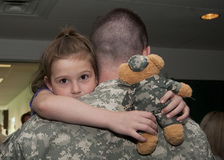 On the morning of September 11, 2001 I was in my first month of student teaching. I was doing the opening "ceremony" before a class of first graders. We looked at the calendar, read the new words on the word wall, and talked about the weather. As I was in mid-sentence, my supervising teacher ducked her head in to say that a plane had hit the World Trade Center in New York. The reality of this tragedy didn't take hold for me until the children had been dropped off at their P.E. class and we caught a live broadcast just as the second plane hit the tower. The children went about the rest of their day oblivious to what had happened. The teachers, however, were all too aware of what was going to happen next. This was a town with a high-profile air base. Many students were children of airmen. I recall, specifically, looking at little Mattie. She was a happy little girl, all smiles and curls. She came to me the next day, with something in her eyes that was deeper than the wide-eyed awe and confusion that many of the children had returned with. She new her father would be leaving soon. As the weeks went on and the halls became draped with giant hand-print American flags and artwork depicting the burning towers, Mattie decided that she would show her patriotism and love for her father by wearing a small American Flag pin made out of safety pins and beads. One day I came in, after shadowing kids at recess, to find Mattie in tears. She had lost her pin. She had shown very little sadness and only talked about her father with pride, never that she missed him. At that moment, though, I knew that she was not crying over her pin. She was crying because we missed her father, her hero, her daddy. On this Memorial Day, lets recognize the sacrifice of those that have died in combat for our country, but lets also recognize those in the military who lose time with their loved ones while in service. Finally, lets recognize the sacrifice of children who lose months and years with a parent so that we can live in a free and prosperous land. They give us a beautiful gift.  A couple of years ago, my husband Adam Brackin and I presented a paper in Oxford on Video games as a tool for cultural and social development for individuals on the Autism Spectrum. This was not presented to a room of people well versed in the Autism Spectrum, but to a room of scholars whose background focused on the impact of video games and new media on today's culture. With 1/66 children now being diagnosed with an autism spectrum disorder, autism in itself has, and will continue to become a huge factor in our cultural identity. Because video games and technology resonate highly with so many in the population of individuals with autism, this topic was of great interest. Feel free to read the draft copy of our paper here.  My passion... helping parents to understand how their child learns. She sat across from me, like so many before her looking baffled and frustrated. She had just been given a report, diagnosing her son with a learning disability. "We paid all this money" she said, "but what does it mean?". I sat and talked through the report with her like I had done with so many parents before. Reports from Psycho-educational Evaluations, whether from a public school, or from a private practitioner are not known for their parent-friendliness. Historically, they have been difficult to decipher and a bit impersonal. Because of this,I continually became the interpreter, helping parents apply information gained from these intimidating documents. Finding myself in this role inspired me to become an Educational Diagnostician. As a diagnostician, I have made a commitment to write psycho educational reports that are both professional, understandable and applicable. Through my training I have discovered my passion for giving parents a clear picture of how their child learns! Then I spoke with another mother... "We would love to understand more about how she learns, but we really don't want her to be 'diagnosed'. We had a learning center do some testing, but it would be great to get a more comprehensive picture." At this moment, a thought struck me. "Why", I thought, "do we have to reserve valuable info on learning processes and abilities for kids that are considered 'diagnosable'. Don't we all have strengths and weaknesses? Don't we all benefit from greater knowledge of self? Wouldn't parents be more empowered with the knowledge of how their child learns and what their child knows, especially if the report is designed to answer their questions?" A cognitive analysis is the use of standardized measuring tools in an individualized, but comprehensive way to determine someone's cognitive and academic abilities in order to make individualized recommendations in regards to therapies, interventions, learning environments, and teaching methods. This tool can empower parents with the knowledge they need to greatly impact their child's educational experiences. It is now my most popular assessment service 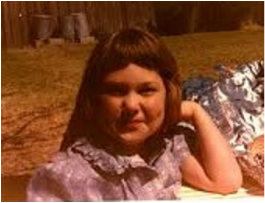 "You will never be able to read", I heard my teacher say under her breath as I walked back to my desk. I was nearing the end of my first grade year. Those seven little words lit a spark somewhere deep in my psyche, that continues to burn even today. In many ways, I am thankful for that careless, hurtful statement because in the long run it made such a positive impact in my life. I didn't realize it at the time, but my mother was my biggest champion. She recognized that school was more difficult than it should have been. I had, after all, been playing the violin since I was three, loved to draw and build with Legos and enjoyed listening to people read books. I knew and remembered facts and information, but school was still a struggle. I had trouble remembering math facts, I couldn't remember how to borrow or carry, and word problems were baffling. I could read, but stumbled through the sentences, skipping words, and missed the meaning of what I read and my handwriting was terrible. My mother advocated for me in the schools, when the school refused to test me for special education, she had a private assessment done. The test, among other revelations, showed that I could read words on a middle-school level, but still struggled through written paragraphs. Her willingness to get an outside assessment for me, convinced the school district to do their own assessment. By 2nd grade I was pulled out for resource for 1-2 hours a day. I had fantastic teachers who addressed my learning needs using individualized teaching methods. They were innovative and intuitive. I still use some of their teaching methods today with my own clients! After 3 years in a special education, resource classroom, a year in second grade and 2 years in 3rd, I was mainstreamed back into a general education class. Though I continued to have to work for every A and B that I got, I was a successful and independent learner. That success and independence carried me through my bachelors degree in special education, a masters in human development, and an educational diagnostician certificate. If you are your child's biggest advocate, if you see the struggles, but also see the potential, I applaud you and thank you. You don't have an easy job, but the rewards can be great! It is because of my own experiences and the determination of my mother that I now have a passion for helping families that are looking for educational solutions for their children. In every child, I see a bit of myself, in every parent, I see a bit of my warrior mom. Thanks for allowing me to be a part of your mission! |
AuthorLisa works with families who are looking for educational solutions for their children. She has provided services to families in the DFW area for over 10 years. Archives
October 2019
Categories |
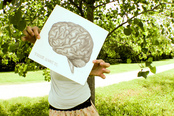
 RSS Feed
RSS Feed